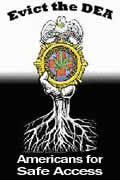How To Use Your First Amendment Rights
This Report Was Written By The People at Florida CAN
http://www.fla-can.org
Return To OnlinePot’s Legal Section Main Page


click to enlarge
I Guess This Photo Would Be Called
"What Not To Do At A Rally"
How to use your First Amendment Rights
"Congress shall make no law respecting an establishment of religion, or prohibiting the
free exercise there of, or abridging the freedom of speech, or of the press; or of the
right of the people peaceably to assemble, and to petition for a redress of grievances.
1st Amendment to the US Constitution
Over the years the courts have interpreted the First Amendment and have assigned different levels of protection to different kinds of speech. Non commercial political speech and petitioning is afforded the highest protection of any form of speech.
The most important factors in determining your right to exercise free speech are:
- The location you choose.
- The type of activity you will engage in.
A WORD OF CAUTION
Do not carry anything illegal on you while petitioning or protesting in public. Check your pockets and wallet before you arrive at your location. If you are Harassed or even arrested by law enforcement your issue remains one of pure speech and the case in easily be disposed of.
Different locations receive different levels of protection from the courts regarding free speech activities. Some locations, like outside of courthouses, have been traditionally set aside as public forums Other traditional public forums include outside government facilities, all public sidewalks and most public parks. The Government has reserved the right to regulate free speech in what is known as reasonable time, place and manner, i.e. screaming on a megaphone at 4:20 in the morning in a residential neighborhood would probably violate all three standards. Do not rely on law enforcement or administrators to define what activities are permitted at particular locations find out for yourself. The content of your speech is irrelevant in determining reasonable time, place and manner.
Do you need a permit to engage in free speech?
Many types of speech activities do not require a permit. When they are required, the permitting scheme must be content neutral, must not be cost prohibitive and must be granted promptly. Types of speech that generally do not require permits are handing out of literature, petitioning, holding a sign or talking on a soapbox in any public area.
Any citizen has a right to hand out literature and collect petitions outside a government building. When choosing the location be sure not to obstruct any entrances, exits, walkways, fire hydrants. You may approach any member of the public to ask them to sign a petition or take a pamphlet, be sure not to threaten or harass anyone that disagrees with you or refuses to sign.
Festivals, Parades, Demonstrations and Amplified sound
In order to put on an event that involves utilizing public facilities a permit is usually required. When a large group of people wants to gather and use amplified sound and reserve a particular location like a band shell in a city, county or state park, the government has the right to set up a permitting process. This process is limited in what it can require of the applicant and must be constitutional. The primary purpose of the application process should be to make sure that two or more groups are not scheduled to use the same space at the same time. Provided the event is not charging admission or restricting attendance and is not selling alcohol, there is very little the government can require of you to use public facilities.
Amplified sound, a megaphone or a public address system, that exceeds the local noise ordinance is not always guaranteed by the first amendment.
Noise ordinances are often vague and unconstitutional. Waivers to the noise ordinance are routinely granted for special events upon request. In the case of a megaphone outside a government building, police will often say you are disrupting the proceedings inside; send someone inside to see if this is true. If Police say you are exceeding the decibel limit ask to see the meter readings.
If you are planning a parade that involves closing down streets a permit is almost always required, however a march that stays on public sidewalks and obeys all traffic signals often does not.
When receiving any permit application always ask for a copy of the corresponding ordinances that authorize the application.
Spontaneous Demonstrations
*The State Police in a raid on a Monday night kill an accused marijuana grower, and you and a group of citizens wish to demonstrate the following morning at the State Police Headquarters and petition to have the Police Officers fired.
Even if there are permitting procedures in place for demonstrations at Police HQ, they cannot be construed to prevent spontaneous protests. Notification to authorities on protests is a courtesy and not a constitutional requirement. As always take note of your local noise and traffic ordinances, unless your intent is nonviolent civil disobedience to provoke mass arrests.
Attending Public Meetings and Proceedings
Every citizen has a right to attend public proceedings and in most cases record and photograph the proceedings. This includes access to courtrooms, city and county council meetings and any session of the State Legislature. Around the State, judges, prosecutors and bailiffs have attempted to deny citizens access to courtrooms to witness or record proceedings.
Note: Flash photography during court proceedings is generally prohibited and it is a crime to secretly record anybody’s private conversation. A Judge may also ban cameras from a proceeding often to protect the identity of informants. However; a citizen has aright to a hearing on why cameras or recorders are being excluded.
Interactive Scenarios
The remainder of this page is designed to encourage you to examine various situations that could occur, during a free speech exercise. Most of the scenarios come from the case files of CAN"s Legal Support Network. Consider the responses you might give during each encounter and then refer to the latter part of the page for the Legal Support Network’s recommendations.
Scenario A
Three of you are petitioning for medical marijuana outside your county courthouse, you are standing outside well clear of the doorways, you have a sign set up to the side that criticizes the police for arresting patients and you are handing out literature. A court bailiff approaches you and says "you can’t do that here, you’re going to have to leave."
You should always politely respond saying "I have a first amendment right to talk to people on public property"
The bailiff may say,
- Well, I am going to call the sheriff."
- This property belongs to the courthouse."
- Somebody complained."
- Do you have a permit?"
- Well, marijuana is illegal and you can’t do that here."
- " You’re going to have to move across the street onto city property?"
- " You can hand out flyers, but you have to remove the sign."
- " You can’t approach people, they have to come to you."
- " Can I see some ID?"
- " I’m going to check with the judge, you have to stop while I check"
- " Come with me so we can talk inside?"
- " Well this is against our policy."
Check your responses to the Legal Support Network’s recommendations below.
Scenario A Part Two
You are continuing to petition, two deputies have arrived, along with a friend of yours with a video camera. By now you should have written down or memorized the bailiffs name.
The deputies say,
- " Who’s in charge here?"
- " Do you have a permit?"
- " Can I see some ID?"
- " Come over to the car with us?"
- " We’re going to have to confiscate that sign."
- " Stop filming us."
- " We’re going to have to search your backpack."
- " If you don’t have a permit, you will be arrested if you refuse to leave."
Recording devices are always recommended when you are out doing free speech work. Don’t count on the friend to just show up! Preplan your next encounter with Government officials by having an audio recorder and camera or better yet, a video or digital recorder on hand.
Scenario B
You and some friends have gathered at a city park. You have setup a table and a canopy on the grass at the edge of the major walkway inside the park. Your table is not blocking the pathway. On the table you have literature, petitions, voter registration cards and a donation jar, as well as books, bumper stickers and T-shirts all relating to the cause.
The parkkeeper approaches and says:
- "You"re going to have to pack up and leave, this is against park regulations."
- "Do you have a permit?"
- "I’m going to call the Police."
Scenario B Part Two
The City Police arrive and say:
- "You can stay as long as you take down the table and the canopy."
- "You can’t sell anything without a vending license."
- "We are going to write you a citation for vending without a permit."
- "We are going to seize your display."
Scenario C
You are outside a Wal-Mart at the local mall, you are petitioning with a clipboard and handing out flyers, the Salvation Army is handing out information and collecting donations next to you. The store manager comes out and tells you to leave or they will call the police. What do you say?
Scenario D
You have set up a small card table containing literature and a donation jar on Main St. downtown next to a New York Times vending box. You are not blocking the sidewalk or obstructing a fire hydrant. You are taking up no more space than the newspaper box. The Police arrive and make the threats that we have discussed, what do you say?
Scenario E
You are outside a major sporting event or concert at your city stadium or arena, i.e. a football game or a Rolling Stones-concert. An administrator who says they represent the stadium says:
- You are on private property and if you don’t leave I will have you arrested for trespassing."
Scenario F
You are petitioning at the Local bus, train station, airport or public transit area and are asked to leave. What will you do?
Scenario G The Follow Up
Now, let’s suppose that after any of the above situations you have been sent to a government office to get a permit for your activity i.e. The Department of Parks, The County Clerk or the Police Department. You ask for the permit forms and corresponding ordinances relating to your activity.
The bureaucrat you are dealing with says:
- "There is no permit required for that activity."
- "Our policy prohibits that kind of activity."
- "You have to schedule an item on the agenda at the next meeting of the county commission in three weeks and get their approval."
- "Here are the forms including fees and insurance requirements."
- "You have to get permission from the County Judge and the Chief of Police."
- "You have to go and petition the businesses and residents in the area that you’re planning to speak."
- "You need to submit your proposed activity to us in writing before we will give you the forms."
- "The person that deals with that won’t be back until next week."
- "The area you are requesting is managed or leased to a private corporation so you have to ask their permission."
What to do if arrested during a free speech activity.
If you are arrested during a free speech activity don’t panic. The only information you have to give to the police is your name, address and date of birth. You might reiterate that you have a legal right under the first amendment to have engaged in your activity and that you believe this to be a false arrest and that you would like to contact legal services. Do not sign anything, say anything or consent to any searches until you have contacted your lawyer. Keep demanding your right to a phone call until you get it. If you have not been able to reach legal services before your first appearance, which may occur within 24 hrs. Ask the judge to appoint you a lawyer or to allow you to contact one. Always ask the Judge to release you on your own recognizance, if the judge won’t, then ask that your bail be reduced. Emphasize that you want to show up in court to fight these charges.
Answers and Explanations
Scenario A.
Always make sure that you or someone in your group is continuing to exercise your rights, do not stop passing out flyers while the authorities try to investigate.
- "Okay, go ahead, I have a right to be here. What is your name sir?
- "This courthouse is public property and belongs to everyone."
- "I have been polite to everyone; I can’t help it if some people disagree with giving medicine to sick people."
- "I don’t think a permit is required for petitioning at any courthouse in America, but if you could tell me where I get the application I would be glad to look into it."
- "Marijuana laws have nothing to do with my right to petition hereon any issue including pay raises for bailiffs. "
- "I don’t want to move across the street I am on public property and there are more people here to talk to. Could you please show me an ordinance or policy that says I can"t petition here?"
- "My sign is not obstructing anything and is safely secured."
- "I have a right to approach and talk to people and they are free to refuse the flyers and make there own choices, we are always polite to everyone."
- "Why are you asking for my ID, am I suspected of a crime?
- "Okay, go and check with the Judge, but I am continuing to exercise my first amendment rights. "
- "No sir, I am quite comfortable here thank you.
- "Could you please show me the policy or tell me where to get a copy."
Remember: the Courthouse is set aside as a public forum. Often times the Legal Support Network has found that bailiffs have not been trained to protect a citizen’s constitutional rights. If you are cool, confident and know your rights, you may be educating the bailiffs.
Scenario A Part two
It is a good idea for the most confident person to be the spokesperson but it is very important that everyone stays in earshot, do not let the police separate you.
- "Well no-one is in charge but I will be glad to talk to you."
- "I didn’t think a permit was required for free speech outside a courthouse."
- "Why are you asking for ID am I a suspect in a crime? If the officer says he will arrest you for failure to ID you can choose to either present a valid ID or verbally tell them your name, date of birth and place of residence. Do not lie and make up information. If you prefer not to produce 10 the law in this situation does not require you to do so. Police often use holding your ID as a way to disrupt your activity. Verbal identification is sufficient.
- "I am quite comfortable talking to you here unless I am under arrest."
- "The sign is not obstructing anything and is safely secured." If Police start to grab the sign, do not physically resist, in fact in any encounter with law enforcement do not ever touch them, you are of course free to verbally resist their actions.
- "We have a right to film anything in the open on public property; or we are making a documentary." Again if Police grab the camera stay calm and do not physically resist. Do not however stop filming until they grab the camera.
- "I have a fourth amendment right to privacy and do not consent to any search of my personal property. You have no probable cause to conduct any search of my effects on me."
- "I would like you to tell me what charge I will be arrested on anyd where to get a permit. I don’t believe a permit is necessary and if I am arrested I will consider it a false arrest and a violation of my civil rights. Could you please check with your shift commander or your staff attorney before you make this decision?"
If they agree to contact superiors continue your activity; if they don’t and insist that you leave you have a decision to make.
If you are sure of your rights, then an arrest is not a disaster; in fact, it can be very helpful to your cause in terms of publicity and civil damages that you may recover.
If you are in a group it is best to select one person to continue the activity and take the arrest, make sure someone else has possession of that persons valuables like money, car and house keys. The rest of the group can then back down and act as witnesses to the police conduct during the arrest. Witnesses should immediately contact legal services in the event of an arrest. Taking only one arrest greatly reduces the time and expense of litigation.
If you choose not to get arrested, tell the Police that you are leaving peacefully, but under duress. Get their names and instructions on how to complain and get a permit. Immediately write down an account of the events and report the incident
Scenario B
- "Could I see those regulations please."
- "I didn’t think we needed a permit to gather in our park."
- "Okay, but we are not doing anything wrong."
In some areas park officials have the same privileges to arrest and ticket that law enforcement do, know your area when doing work in parks.
Scenario B Part Two
- " Why do we have to take down the table and the canopy, this is a public park do people not use canopies and tables for picnics?"
If the Police can site you an ordinance that requires a permit for a structure, find out where to get the paperwork and comply, but continue to distribute literature.
- "We are not selling anything. We take minimum and supporting donations for this issue related merchandise. We are not commercial vendors, all the money raised here is to support our speech."
Make sure they know that the literature is being distributed free of charge and contributions for that are voluntary. You could also say you are collecting money for memberships or subscriptions and different levels of contributions receive particular gifts just like PBS does. For example a $10 membership gets you a free T-shirt, a $25 membership gets you a T-shirt and a book.
These scenarios exist only if the police insist on writing the citation or seizing merchandise.
- In this case, if the Police write a citation, they have to have identified an individual who is in charge, usually the person arguing with them. They can be confused by everyone taking responsibility for the display. If they insist on writing the citation take it and report it to CAN or your lawyer.
- If they seize your display ask for an inventory of items seized and demand an explanation, make absolutely certain you have their names and correctly identify the agency they work for. Report immediately to CAN services.
Quite often the Police do not understand the distinction between commercial vendors who require licenses and free speech displays. They will even send in under covers to try to make a purchase at the table, be sure to keep your terminology consistent. If Police insist that you cease fundraising, ask them were to get a solicitors permit. To obtain a solicitors permit should be a simple and almost instant process, there may be a very small fee involved. Even a small fee can usually be waived if you are indigent. If the process seems complicated or charges excessive fees, it is probably unconstitutional. Please report the incident and send the paperwork to CAN.
Scenario C
Unfortunately, shopping malls are considered private property, so even though the Salvation Army are outside Wal-Mart, it is at the discretion of the Management to determine who gets to solicit. Your response in this case would be to ask management at the store for permission or politely explain you didn’t understand the policy and leave. Remember your First Amendment rights to protest do not apply on private property, you must always ask permission. Many club owners are willing to let you set up tables on their property, so don’t be shy.
Scenario D
Similar to the courthouse and the park, your greatest defense here is the news box. If the New York Times has the right to sell it’s newspaper which contains both pure and commercial speech (they take advertising dollars). Your statement to Police could go something like this. "I believe I have an even greater right to be here than this NY Times box. I am not obstructing the regular flow of traffic and am taking up no more space than this box. I have aright to solicit contributions for my noncommercial newsletters. If you force me to leave my lawyers will insist that all news boxes also be removed from city streets". This normally works, again, if it doesn’t please file a report.
Scenario E
Several questions must be asked when dealing with a large stadium. Stadiums that are built with some public money or are leased that day for a specific activity are considered limited public forums. Careful research is required to establish where the line between public and private property begins and ends. Always ask where to get documentation of who has jurisdiction of the area outside the stadium. A stadium may designate a particular area for free speech activities. You could spend weeks trying to find out what the policy is, showing up at the Stadium and being told to leave is a sure way to identify the enforcers and establish what the policy is, so it can be challenged later in court if necessary.
Scenario F
The courts have ruled that most public transit facilities are a public forum, but the government or management of those facilities has aright to designate a specific area for speech activities to take place. However if the designated area is so remote an area as to prevent anyone from receiving the message this can be challenged in court.
Scenario G
If you are told there is no permit required for your activity ask that they put that in writing. If they refuse ask who will put that in writing. The answer to all other responses from administrators is that you would like to see the policies and ordinances in writing. If they are uncooperative remind them of the Freedom of Information Act that requires the government to allow you to inspect and photocopy such documents. If they still refuse to cooperate contact CAN.
Checklist for 1st Amendment activities
Know your location.
Empty your pockets – don’t carry anything illegal.
Be Firm, Polite, Calm and Consistent at all times.
Smile and Good Luck
Reporting incidences to your attorney
Recording your encounters with law enforcement immediately helps keep the information clear later. When writing a report, always include the following information:
Time, date and location of the encounter. Names and contact information of all witnesses. Name, title and department of all authorities involved.
Write the details of the encounter in a short narrative: include any relevant details about the location or what led up to the incident. Details about the conduct of the authorities are very important. Quotes that can be substantiated with video or audio are always helpful. In the rare event that an arrest took place, also include the arresting agency, name of arresting officer, where the person is being held, amount of bail and time, date and location of next appearance.
Reports should always, contain supporting paperwork when available. Supporting papers might include, ordinances, arrest reports, permit forms, copies of the literature being distributed.
Each person directly involved should also write a separate statement.






 Button Ads!
Button Ads! 






